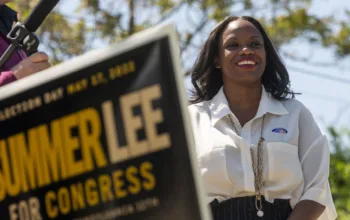
There’s a new kind of love story in the show’s second season, and it’s great.
Every week, we pick a new episode of the week. It could be good. It could be bad. It will always be interesting. You can read the archives here. The episode of the week for June 16 through 23 is “The Scarlet Letter” the third episode of the second season of Freeform’s The Bold Type.
When Caroline Framke wrote for Vox about the first season of The Bold Type — Freeform’s glossy and addictive drama about three New York 20-somethings trying to make it at a women’s magazine — she concluded that it was essentially a romantic comedy for a new decade. More specifically, she wrote, the show is “like one of those aughts romcoms discovered Tumblr and realized it was kinda gay.”
The Bold Type is indeed kinda gloriously gay, and the budding relationship between newly out Kat (Aisha Dee) and experienced Adena (Nikohl Boosheri) has been one of the highlights of the second season, especially the couple’s awkward, heartfelt plot line in episode two about why Kat isn’t willing to go down on Adena yet. (She was nervous that she wouldn’t like it and that would mean she’s not really queer, but turns out she does and she is.)
Less consistently compelling is the relationship between fashion assistant Sutton (Meghann Fahy) and much older board member Richard (Sam Page). The first season attempted to wring tension out of the idea that the two of them had to keep their relationship secret, but in the second season — perhaps because the show figures that the power dynamics there no longer code as sexy in a post-Time’s Up world — Sutton quickly and unambiguously dumps Richard and never looks back.
But for all The Bold Type’s willingness to get sensitive and nuanced about its romantic relationships, it doesn’t let the romances drive story arcs very often. That role is usually reserved for the friendship between our three lead characters, and for their attempts to climb their career ladders and excel at their work.
Scarlet Magazine is what powers the show’s story engine, what motivates the characters and pushes them forward. The romantic storylines tend to act as grace notes, fleshing out the characters and giving them color without dominating their plot lines.
So what became clear in the closing scene of this week’s episode — as Jane (Katie Stevens) begs to return to her old job at Scarlet, only to be refused — is that while The Bold Type is recognizably a romantic comedy, the love interest isn’t a man. It’s Scarlet itself.
The Bold Type is telling a classic will-they-or-won’t-they story between a woman and her job
Jane’s plot line was often the weakest part of The Bold Type’s first season, but her season two plot has been a treat. Jane’s a writer who in the pilot has been newly promoted out of her assistant position to become a staff writer, and who has always dreamed of writing for Scarlet — although, confusingly, she seems to simultaneously adore Scarlet’s glossy aspirationalism and find the idea of writing about clothing and relationships and the other mainstays of women’s magazines to be degrading. (Imagine spending your adolescence dreaming of writing for Cosmo and then when you finally make it there you go, “Oh, no, I’m not interested in giving readers orgasm tips.”)
Over the course of the first season, Jane struggles to create workable boundaries between the parts of her life that are personal and the parts that are fodder for stories, gradually developing her voice as a writer and finding the kind of work that she’s best at. And when at the end of the first season she’s offered a splashy new job at an up-and-coming political news site, Incite, she leaves the warm embrace of Scarlet to create her own vertical.
It’s all a little bit irritatingly smooth sailing for Jane, a little bit “Rory Gilmore talking her way into a job at a newspaper that isn’t even hiring out of sheer moxie.” Professional success seems to come to Jane so easily that it’s hard to root for her wholeheartedly — which is why it’s so satisfying when episode two of the second season sees her fired from Incite.
Jane’s firing is a nicely developed mini-arc, one in which neither she nor her new employer is entirely at fault: Jane writes a sympathetic profile of a Miki Agrawal-like CEO, and her new editor turns it into a hatchet job behind Jane’s back. Jane calls the CEO to apologize, and her apology leaks to the web and becomes a meme; when Incite sends her onto TV to apologize for the apology, Jane ends up doubling down on her stance and throwing Incite under the bus.
There’s a careful distribution of blame here: It’s gross of Incite to edit Jane’s piece so dramatically behind her back, but Jane’s decision to publicly criticize her new employer is far from professional.
So when Jane’s Incite editor calls her into her office the next day to say, “I made a mistake thinking you would be a good fit at Incite,” the move feels deeply earned. (Such a brutal kissoff line! So unambiguously dismissive!) It’s a real failure for Jane, finally, after a season of nothing but wins for her, and while it’s not entirely her fault, she bears enough responsibility for the weight of it to land.
The move also frees up Jane to go back to Scarlet, as we all know she will eventually, just as we all know that the main girl and the main guy will end up together at the end of a traditional romantic comedy: If Jane is one of our leading ladies, then Scarlet is her love interest, and their relationship is our will-they-won’t-they.
But a really compelling will-they-won’t-they needs some juicy dramatic tension, and if Jane had ended up going right back to Scarlet, as she decided she would try to toward the end of this week’s episode, it would have felt disappointing. They just had their breakup! This is the chance to draw out the pining, to let things simmer at a slow burn.
And luckily for us, omniscient Scarlet editor Jacqueline (Melora Hardin) thinks so too.
“You have some growing up to do, Jane,” Jacqueline says when Jane approaches her to ask for her job back. “You need to live in this failure. You can’t be afraid of it.”
“I’m not here because I’m afraid,” Jane protests. “I’m here because I love Scarlet.”
“I think, if you’re really being honest with yourself, it’s both,” Jacqueline replies.
The scene plays exactly like the classic romcom staple where someone has foolishly broken up with their true love and then, realizing their mistake, tries to fix it (“I’m not here because I’m afraid! I’m here because I love you!”) — but the other person realizes that the timing isn’t quite right yet.
It’s very Michael telling Jane that he doesn’t want to be her safety choice on Jane the Virgin; very Sally telling Harry that he doesn’t really love her, he’s just afraid of being lonely. It’s a classic beat in the will-they-won’t-they — it’s just that here, the love story is the job.
That The Bold Type is willing to let the careers of its three heroines be their love stories, to fully center their ambition and their professional growth as the most important part of their character arcs, is what makes it feel so fresh and so compelling. And the fact that it finally seems willing to make all three of those career arcs messy and complicated and fraught has made the second season, so far, even better than the first.
The Bold Type airs Tuesdays at 9 pm Eastern on Freeform. The first season plus the first three episodes of the second season are currently available to stream on Hulu and Freeform.com.
Read More
https://cdn.vox-cdn.com/community_logos/52517/voxv.png


